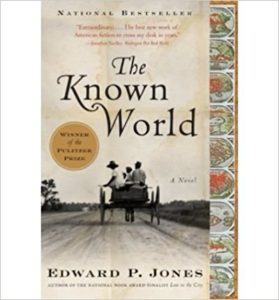 The Known World, by Edward P. Jones, tells a story so rich and intricate, so visionary, it’s impossible to describe except in the flattest terms. The novel, which won the 2004 Pulitzer Prize, takes place in antebellum Virginia — before Emancipation. People own slaves: former slaves own slaves, whites own slaves. People who own slaves and people who are slaves engender children together. Slaves escape and slaves stay put. It’s all about slavery, of course it is, yet to call it “a book about slavery” is like calling War and Peace a book about nineteenth-century Russian aristocrats. The Known World doesn’t belong to a genre or thematic category. It’s fiction that tells the truth about the bonds that oppress us and the bonds that nourish our spirits; it’s a story that follows the way we move together, all of us, rough and smooth, ugly and transcendent. The title itself unfolds its mystery; The Known World brings us into the world that we see, hear, feel, taste, and smell — and by implication into the vast realm of our world that’s too deep, too shadowed, too evasive, too seemingly peripheral, often too painful to be easily known or even ever known.
The Known World, by Edward P. Jones, tells a story so rich and intricate, so visionary, it’s impossible to describe except in the flattest terms. The novel, which won the 2004 Pulitzer Prize, takes place in antebellum Virginia — before Emancipation. People own slaves: former slaves own slaves, whites own slaves. People who own slaves and people who are slaves engender children together. Slaves escape and slaves stay put. It’s all about slavery, of course it is, yet to call it “a book about slavery” is like calling War and Peace a book about nineteenth-century Russian aristocrats. The Known World doesn’t belong to a genre or thematic category. It’s fiction that tells the truth about the bonds that oppress us and the bonds that nourish our spirits; it’s a story that follows the way we move together, all of us, rough and smooth, ugly and transcendent. The title itself unfolds its mystery; The Known World brings us into the world that we see, hear, feel, taste, and smell — and by implication into the vast realm of our world that’s too deep, too shadowed, too evasive, too seemingly peripheral, often too painful to be easily known or even ever known.
The mule followed him, and after he had prepared the animal for the night and came out, Moses smelled the coming of rain. He breathed deeply, feeling it surge through him. Believing he was alone, he smiled. He knelt down to be closer to the earth and breathed deeply some more. Finally, when the effect began to dwindle, he stood and turned away, for the third time that week, from the path that led to the narrow lane of the quarters with its people and his own cabin, his woman and his boy. His wife knew enough now not to wait for him to come and eat with them. On a night with the moon he could see some of the smoke rising from the world that was the lane— home and food and rest and what passed in many cabins for the life of family. He turned his head slightly to the right and made out what he thought was the sound of playing children, but when he turned his head back, he could hear far more clearly the last bird of the day as it evening-chirped in the small forest far off to the left.
To put us into this world, Jones bends the novel form ever so beautifully. Points of view jumble, time jumps. A character comes into the story, and Jones jumps out of the narrative to give a precise stream of that character’s life, sometimes all the way to the end. Then he puts us right back in the narrative.
The county in the story is fictional, but anyone who lives in central Virginia will recognize it. A century and a half after its period setting, Jones’ Manchester County is still vividly real. The people, the terrain, the seemingly homogenious religious outlook that dwells very differently within each person, the ties of place and family bedevilled by race and class, the benighted impulses to do right, the ease of doing evil, the persistence of exploitation — all of it lives on. Our known world is still in many ways a “demon state,” as one of its inhabitants sees it. Yet, the land, and all the creatures of it, this known world is, too, “one exquisite creation.”
In an interview with publisher HarperCollins, Jones refers to himself, almost in passing, as “the ‘god’ of the people in the book.” Most fiction writers surely see themselves that way at times, maybe facetiously, or even sardonically — a book’s people can seem to rule a writer’s life and mind, themselves become gods. Jones as “god” brings into being a world of people and animals, dirt and plants and sun and rain. Godlike, he works unseen, just like your own god, the god of your own world. Creaturelike, the people of his book take on lives of their own, each living under (or without) his or her personal god. But who, in Jones’ cosmos, might God really be? No spoilers. Read The Known World and find its God.
BUY: Find it at your local bookstore via IndieBound | amazon
The Known World, by Edward P. Jones. HarperCollins, 2003. For the book at HarperCollins, and the full interview of Edward P. Jones: link
For a personal meeting with Edward P. Jones, the author, read “The Known World of Edward P. Jones,” by Neely Tucker at The Washington Post: link